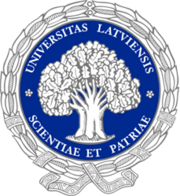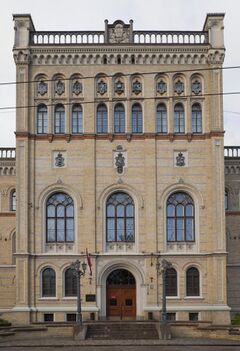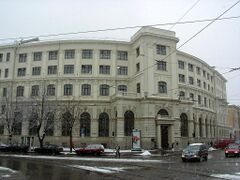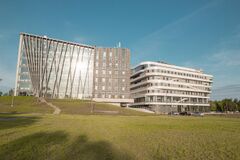Organization:University of Latvia
Latvijas Universitāte | |
 | |
| Latin: Universitas Latviensis | |
| Motto | Scientiae et patriae (For science and fatherland) |
|---|---|
| Type | Public |
| Established | 1919 |
| Rector | Indriķis Muižnieks |
| Students | 15,200 (2018) |
| Undergraduates | 9,680 (2014) |
| Postgraduates | 3,536 (2014) |
| 118 (2018) | |
| Address | Raiņa bulvāris 19 , , |
| Affiliations | Campus Europae, Utrecht Network, EUA, UNICA, IAU, AUF, Talloires, Educause |
| Website | www.lu.lv |
| File:University of Latvia logo.png | |
The University of Latvia (LU) (Latvian: Latvijas Universitāte) is a state-run university located in Riga, Latvia. It was established in 1919.
The university is ranked 801st-1000th in the world in 2019 and have had the highest place as 651st–700th in 2017 [1] as well as 7th in the Baltic states after the University of Tartu, Vilnius University, Vilnius Gediminas Technical University, Tallinn University of Technology, Kaunas University of Technology and Riga Technical University[2] and 50th in EECA (Emerging Europe and Central Asia) rating.[3]
History

The University of Latvia, initially named as the Higher School of Latvia (Latvian: Latvijas Augstskola) was founded on September 28, 1919 on the basis of the former Riga Polytechnic (founded in 1862).[4] The first rector of the university was chemist Paul Walden. In 1923, the school received its current name with the approval of its constitution, the University of Latvia (Universitas Latviensis).
In the period between 1919 and 1940, the University of Latvia was the main centre of higher education, science and culture in the Republic of Latvia. The former building of the Riga Polytechnic on Raiņa bulvāris 19 serves as the university's main building. In the pre-WWII years, it was possible to gain higher academic education not only at the University of Latvia but also at the Latvian State Conservatory and Academy of Arts.
With the beginning of the Soviet occupation, the university was renamed as the Latvian State University (LVU, Latvian: Latvijas Valsts Universitāte) from 1940 to 1941 and from 1944/1945 to 1958. Under the Nazi occupation, from 1942 to 1944/1945 its name was the University of Riga (Latvian: Rīgas Universitāte). After World War II, over time the Latvian University of Agriculture, Riga Stradiņš University, and Riga Technical University separated from the University of Latvia and became well-known centres of education and research in their own right. In 1958, the university was renamed as the Pēteris Stučka Latvian State University (Latvian: Pētera Stučkas Latvijas Valsts Universitāte), which was its official name until 1990.
With Latvia regaining independence, the Supreme Council of the Republic of Latvia reconfirmed the Constitution of the University of Latvia on September 18, 1991. It stated that the institution is "a state establishment of academic education, science and culture which serves the needs of Latvia and its people".[5] Alongside the Constitution, the flag, the hymn, the University's emblem, the Rector's chain, and the official garments for the Rector, Vice-Rector and deans were re-adopted as attributes of the University of Latvia.
The EuroFaculty, created by the CBSS to support reforms at the universities in Tartu, Riga, and Vilnius was organized with its headquarters at the University of Latvia from 1993 to 2005.[6] The Riga Teacher Training and Educational Management Academy was merged into the university in 2017.[7]
Enrollment
The University of Latvia offers undergraduate, graduate, and doctoral levels of study and in October 2014 more than 14,000 students, including PhD and exchange students, had enrolled in various study programs.[8] Almost one third of them studied in business and economics related programs.
Organisation
The university consists of 13 faculties:
- Faculty of Biology
- Department of Plant Physiology
- Department of Botany and Ecology
- Department of Human and Animal Physiology
- Department of Hydrobiology
- Department of Microbiology and Biotechnology
- Department of Molecular Biology
- Department of Zoology and Animal Ecology
- Faculty of Chemistry
- Department of Inorganic Chemistry
- Department of Analytical Chemistry
- Department of Organic Chemistry
- Department of Physical Chemistry
- Centre of Food Chemistry
- Centre of Chemistry Didactics
- Department of Optometry and Vision Science
- Department of Mathematics
- Department of Physics
- Laser Centre of the University of Latvia
- Extramural Mathematics School of A. Liepa
- Faculty of Business, Economics and Management
- Department of Global Economics Interdisciplinary Studies
- Department of Economics
- Department of Finance and Accounting
- Department of Management Sciences
- Faculty of Education, Psychology and Arts
- Department of Education sciences
- Department of Pedagogy
- Department of Psychology
- Department of Teacher Training
- Sports Centre
- Centre of Adult Pedagogical Education
- Faculty of Geography and Earth sciences
- Department of Geography
- Department of Geology
- Department of Environmental science
- Faculty of History and Philosophy
- Department of History and Archaeology
- Department of Philosophy and Ethics
- Faculty of Law
- Center of continuing legal education and professional development
- Student government
- Chair of Civil Law
- Chair of Constitutional Law
- Chair of Criminal Law
- Chair of International and European Law
- Chair of Legal Theory and History
- Legal Clinic of the Faculty of Law
- Faculty of Medicine
- Centre of Health Management and Informatics
- Department of Anatomy and Histology
- Centre of Experimental Surgery
- Department of Pharmacology
- Department of Internal Medicine
- Department of Medical Biochemistry
- Department of Medical Pedagogy, Ethics and History
- Department of Oncology
- Department of Surgery
- Department of Pathology
- Department of Pediatrics
- Centre of Social Pediatrics
- Faculty of Humanities
- Department of Asian Studies
- Department of Contrastive Linguistics, Translation and Interpreting
- Department of Classical Philology and Anthropology Studies
- Department of English Studies
- Department of Germanic Studies
- Department of Latvian and Baltic Studies
- Department of Romance Studies
- Department of Russian and Slavonic Studies
- Faculty of Social sciences
- Department of Information and Library Studies
- Department of Communications Studies
- Department of Political Science
- Department of Sociology
- Center for the Cognitive Sciences and Semantics
- Faculty of Theology
- Department of Systematic and Practical Theology
- Department of Church History and History of Religions
- Department of Biblical Theology
- Faculty of Computing
- Chair of Computer Science
- Chair of Programming
- Chair of Mathematical Foundations of Computer Science
- Chair of Informatics Lifelong Learning
- Methodological Laboratory of Computer Science Studies
- Methodological Laboratory of Computing Studies – The Linux Centre
In addition to the university's various faculties and its medical wing, the Riga Medical College (Rīgas Medicīnas koledža), the University of Latvia offers most of the resources traditionally associated with accredited universities, including several libraries, research facilities, study centres, a language school, and a career centre.[9]
Institute of Mathematics and Computer Science
The Institute of Mathematics and Computer Science of the University of Latvia (Latvian: Matemātikas un informātikas institūts, IMCS) was founded in 1959 as a computer research centre, now consisting of about 200 researchers, assistants, engineers, and software developers.
Institute of Geodesy and Geoinformatics
The Institute of Geodesy and Geoinformatics (GGI) of the University of Latvia (Latvian: Ģeodēzijas un ģeoinformātikas institūts) is the reestablishment of the Institute of Geodesy since 1994. The researchers of the Institute of Geodesy (1924-1944) worked successfully on the research and education in many advanced topics of that time – development and adjustment of National geodetic networks, photogrammetry, studies of vertical Earth movement and research in gravimetric and magnetic measurements. Currently, the research areas are developed in satellite geodesy and geoinformatics. The main topic is the development of satellite laser ranging systems (SLR), both the hardware and control software. Two SLR prototypes were developed till 2010 by spending low expenditures. The third most improved model is under development now. All the knowledge and experience of the staff gained since 1975 is applied. Younger colleagues are involved in the development process.
The prototype digital zenith camera for studies of vertical deflection has been developed recently. The test results reach a precision of 0.1 arc second which is very promising for the improvement of the quality of the National model of Latvia gravity field modelling. The recent version of the National gravity field developed at the Institute of Geodesy and Geoinformatics has achieved a precision of about 2 cm which is much higher than the previous model (7–8 cm) used in Latvia. The high precision gravity field model is very important for practice. It gives the possibility to achieve correspondingly high precision of normal height determination using Global Navigation Satellite Systems (GNSS) in geodetic measurements.
There has been achieved at the Institute of Geodesy and Geoinformatics the high precision results in studies of vertical and horizontal motion of the Earth in Latvia by carrying out the analysis of the 7 year GNSS observations at the LatPos and EUPOS-RIGA permanent station networks.
There are developed the GIS database for Latvia and cities of Latvia, developed digital terrain models.
Amateur Art Activities
The university has a number of amateur choirs, orchestras and dance groups, as well as a student theatre. Minjona is a women's choir based at the University of Latvia.
People
Notable professors and lecturers
- Indriķis Muižnieks, biologist
- Andris Ambainis, computer scientist
- Mārcis Auziņš, physicist
- Kārlis Balodis, economist
- Konstantīns Čakste, legal theorist and LCP Chairman, son of Latvian President Jānis Čakste
- Jānis Endzelīns, linguist
- Karlis Kaufmanis, astronomer
- Augusts Kirhenšteins, microbiologist
- Eižens Laube, architect
- Jānis Maizītis, lawyer
- Valdis Muktupāvels, ethnomusicologist and doctor of art criticism
- Velta Ruke-Dravina linguist, folklorist
- Andrejs Veisbergs, linguist
Notable alumni
- Māris Čaklais, Latvian poet
- Valdis Dombrovskis, Latvian politician, European Commissioner for Economic and Monetary Affairs and the Euro, former Prime Minister of Latvia
- Klāvs Elsbergs, Latvian poet
- Ivars Godmanis, Latvian politician, former Prime Minister of Latvia, MeP
- Uldis Ģērmanis, Latvian historian and writer
- Ivars Kalviņš, Latvian chemist, has worked on the foundation of mildronate
- Guntars Krasts, Latvian politician, former Prime Minister of Latvia, MeP
- Hugo Teodors Krūmiņš, Latvian playwright and poet
- Zenta Mauriņa, Latvian writer
- Artis Pabriks, Latvian politician, former Latvian Minister of Foreign Affairs
- Andris Piebalgs, Latvian politician and diplomat, former European Commissioner for Energy
- Ilmārs Poikāns, Latvian AI researcher, hacker
- Einars Repše, Latvian politician, former Prime Minister of Latvia
- Eliyahu Rips, Israeli mathematician
- Aminata Savadogo, Latvian singer, songwriter, finalist in Eurovision Song Contest 2015
- Knuts Skujenieks, Latvian poet, journalist
- Mikhail Tal, Soviet-Latvian chess grandmaster and eighth World Chess Champion, nicknamed "The Magician from Riga"
- Daina Taimiņa, Latvian mathematician
- Guntis Ulmanis, Latvian politician, former President of Latvia
- Jānis Vanags, archbishop of the Evangelical Lutheran Church of Latvia
- Raimonds Vējonis, the 9th President of Latvia
- Kristīne Ulberga, novelist, winner of the Raimonds Gerkens Prize.
- Alfred Rosenberg, race theorist and an influential ideologue of the Nazi Party.
See also
- List of universities in Latvia
- Utrecht Network
- List of modern universities in Europe (1801–1945)
References
- ↑ QS World University Rankings University of Latvia
- ↑ University comparison in Estonia, Latvia and Lithuania QS World University Rankings 2019
- ↑ QS World University Rankings: EECA 2019
- ↑ Šiliņš, Jānis (15 October 2018). "The foundation of the Baltic Higher Technical School in 1918". Public Broadcasting of Latvia. https://eng.lsm.lv/article/culture/history/the-foundation-of-the-baltic-higher-technical-school-in-1918.a296064/. Retrieved 17 October 2018.
- ↑ LU.lv
- ↑ Kristensen, Gustav N. 2010. Born into a Dream. EuroFaculty and the Council of the Baltic Sea States. Berliner Wissentshafts-Verlag. ISBN:978-3-8305-1769-6.
- ↑ "Talks under way on reorganization of several universities". The Baltic Course. 2 August 2018. http://www.baltic-course.com/eng2/education/?doc=142001. Retrieved 18 August 2018.
- ↑ LU.lv
- ↑ LU.lv
External links
- University of Latvia
- University of Latvia Riga Medical College
- University of Latvia Institute of Mathematics and Computer Science
[ ⚑ ] 56°57′00″N 24°07′00″E / 56.95°N 24.1167°E




